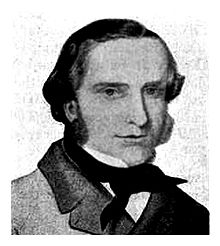Charles Henry Kettle
Charles Henry Kettle (born April 6, 1821 in Kent , England , † June 5, 1862 in Dunedin , New Zealand ) was a surveyor , planner and politician in Dunedin.
Life
Not much is known about Charles Henry Kettle's childhood, except that his father's name was Matthew Kettle, he is said to have been well educated and, at the age of 14, from 1835 to 1839, assisted as a math teacher at the Queens Grammar School in Faversham , Kent .
In 1839 he decided to emigrate to New Zealand . He reached Wellington on January 31, 1840 and worked first as an office worker. When his math skills were discovered, he got a job with the New Zealand Company as an assistant in land surveying. He explored the area around Wellington, Hutt Valley and in the Manawatu District , later he crossed the Tararua Range to Wairarapa together with Alfred Wills and achieved recognition with these explorations.
In January 1843, when Kettle was no longer needed, he traveled back to England . There he came into contact with George Rennie (1802-1860), sculptor, politician and active promoter of the settlement in Otago . Rennie won him for the Otago settlement project. He then traveled around England and Scotland for almost two years , often together with George Rennie and Thomas Burns , to promote the settlement project as a planning expert.
On September 10, 1845, he married Amelia Omer, with whom he was to have 10 children. That same month, the New Zealand Company appointed him explorer of the Otago settlement. On February 23, 1846 he reached Otago Harbor with his wife . Based on the work of Frederick Tuckett almost two years earlier, Kettle set out to plan Port Chalmers and New Edinburgh, later Dunedin. During this time he became known and appreciated as a solid and reliable “worker” who sometimes pushed himself to the limits of his performance through his commitment.
Developed as a strong personality, Kettle clashed more and more with his superiors and eventually came into conflict with William Cargill , the undisputed head of the settlement. Cargill tried in 1851 after the New Zealand Company had withdrawn from the settlement project due to economic problems, to terminate Kettle. Kettle successfully resisted and was finally appointed as a compromise in 1852 as a planner for Otago and six months later as a clerk. But his position was systematically weakened, whereupon Kettle resigned from both positions in 1854 and became a sheep farmer in the Clutha District for several years.
Kettle had already begun securing his future in 1848. He was so successful in buying and selling land that he was finally able to retire in Dunedin in 1860 at the age of only 39. As a result, Kettle became a socially engaged person, with a sense of education and youth work, and was active in the abstinence movement. He missed the election for Otago Provincial Council in 1857, but was able to prevail in the election for the House of Representatives in 1862 and got a seat. In January 1862 he was named auditor of the province of Otago. But he was denied sustainable work in both positions.
He died of typhus on June 5, 1862 in Dunedin .
literature
- Charles Andrew Sharp : Kettle, Charles Henry . In: Alexander Hare McLintock (Ed.): An Encyclopaedia of New Zealand . Wellington 1966 ( online [accessed December 14, 2015]).
- Kettle, Charles Henry . In: New Zealand Encyclopedia . 5th edition. David Bateman Ltd , Auckland 2000, ISBN 0-908610-21-1 (English).
Web links
- Brad Patterson : Kettle, Charles Henry . In: Dictionary of New Zealand Biography . Ministry for Culture & Heritage , June 13, 2012, accessed August 20, 2012 .
- Otago & Southland Bound - History . ancestry.com,accessed May 25, 2016.
| personal data | |
|---|---|
| SURNAME | Kettle, Charles Henry |
| BRIEF DESCRIPTION | English surveyor, planner and politician in Dunedin , New Zealand |
| DATE OF BIRTH | April 6, 1821 |
| PLACE OF BIRTH | Kent , England |
| DATE OF DEATH | June 5, 1862 |
| Place of death | Dunedin , New Zealand |
